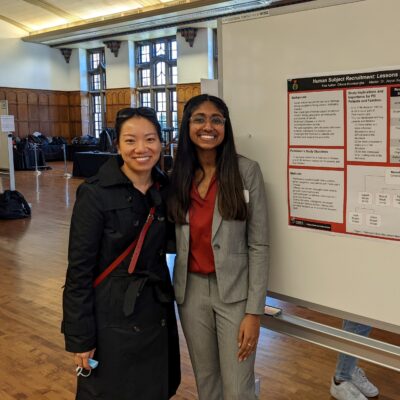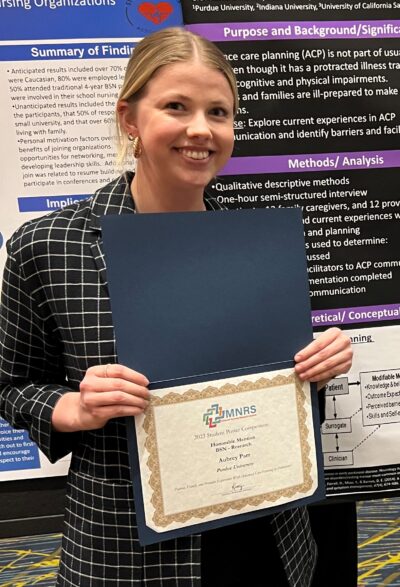Purdue nursing research facilitates better end-of-life planning for families with Parkinson’s disease
Written By: Rebecca Hoffa, rhoffa@purdue.edu
Talking about death and dying can seem scary and full of unknowns, no matter the person’s stage in life. However, for patients with Parkinson’s disease, who have an unpredictable illness trajectory, the timing of these discussions can be critical to ensure the best possible end-of-life care.

Jiayun Xu
Jiayun Xu, an assistant professor of nursing in Purdue University’s School of Nursing, is working to transform advance care planning for individuals with Parkinson’s disease, their families and healthcare providers. Through a study funded by the National Institutes of Health, Xu is working to develop evidence-based videos that not only make the end-of-life planning process less taboo but also help patients and their families feel confident in their decisions and prepared for the progression of Parkinson’s disease.
“Ultimately, our hope and main purpose of doing this is so families and patients will be making better decisions and choices related to their care and be more prepared to make these difficult decisions. For instance, aspiration is common in Parkinson’s, and we don’t want families making last-minute decisions on a feeding tube when the patient is not able to communicate very well,” Xu said.
Approaching end-of-life decisions
Xu has a background in research on advance care planning and end-of-life decision-making with chronic diseases, a line of research that was inspired by her family’s personal bad experience with the end-of-life care for her grandmother. When she arrived at Purdue, she connected with the College of Health and Human Sciences’ strong cohort of researchers studying Parkinson’s disease and wanted to help this unique population navigate end-of-life planning.
Because speech and cognitive changes are common for patients with Parkinson’s disease, it can often be difficult for individuals with Parkinson’s disease to express end-of-life wishes as they move into the disease’s later stages. Additionally, if family members are required to make split-second decisions on behalf of their loved one, they could have to live with guilt over whether or not they made the right call.

Xu, three of her undergraduate research and a palliative care nurse practitioner from IU Health Arnett gave a presentation on advance care planning with the Parkinson’s support group at BoxFit Lafayette.(Photo provided)
The goal of Xu’s study was to develop a free, online resource, where individuals with Parkinson’s disease and their families can get information that is backed by research to help them better prepare for end-of-life decisions. Xu is planning for the videos to ultimately be connected to University of California San Francisco geriatrician Rebecca Sudore’s Prepare for Your Care website.
Xu’s study collected data through interviews with 33 people, including individuals with Parkinson’s disease, their family caregivers and medical professionals. In the interviews, Xu’s team asked about medical decisions, both making them and talking about them, as well as future planning. Xu and her team also gave the interviewees a draft of the online tool and asked them questions about its utility.
Using this data, Xu and her research team coded the information based on recurring themes in the interviews. One of the most prominent findings from the study was that individuals with Parkinson’s disease and their families were often ready to talk about end-of-life care sooner than their healthcare providers. This often led to these conversations happening outside of medical settings, which resulted in more generic discussions that were less effective at making specific end-of-life decisions. Some individuals also had already done advance care planning prior to their diagnosis, but because they had never revisited those plans after their Parkinson’s diagnosis, those documents and conversations were outdated.
“Everyone has different symptoms, and everyone has a different progression, so it’s very difficult to predict what’s going to happen,” Xu said. “That’s one of the reasons why clinicians have such a difficult time deciding when to talk to families and patients about the future. Understandably, clinicians don’t know what’s going to happen, and they don’t want to diminish people’s hope with this disease because they don’t know how long they’re going to be doing well with their treatment.”

Xu poses with undergraduate researcher Dilhara Moonesinghe with her research poster.(Photo provided)
Participants also frequently mentioned mismatched expectations between individuals — family caregivers, patients, clinicians — being the cause of poor end-of-life discussions. Differing expectations were often the result of poor understanding of the disease and its progression. Ultimately, participants said they wanted a resource that was positive and offered future guidance on what could possibly happen without biasing their own decision-making. Xu and her team worked to accommodate this in the resources they developed, which will be entering clinical trials soon.
“What they told us about the resource was ‘Anything that you create, you really have to emphasize that there is still quality in our life even though we have this illness’ — it can’t be all doom and gloom,” Xu said.
A lasting impact
As a clinician and researcher focused on Parkinson’s disease, Jessica Huber, professor in the Department of Speech, Language, and Hearing Sciences, found this research to be extremely eye-opening in her role as Xu’s mentor on the project. She noted this resource will be game-changing for both individuals with Parkinson’s and medical professionals.
“It’s important to get this information out to patients because a lot of times you don’t know what’s coming,” Huber said “You understand the disease in theory, and you understand where you are in the disease, but knowing what’s coming can be hard. What I like about what she’s doing is it’s so clearly directly relevant to their lives.”

Aubrey Parr received honorable mention at the 2023 Midwestern Nursing Research Society Annual Research Conference.(Photo provided)
Like Xu, Aubrey Parr, a senior studying nursing, was fueled by personal experience to begin undergraduate research in Parkinson’s disease by joining Xu’s research lab. Parr’s father has Parkinson’s disease, and she has experienced firsthand the struggles to talk about advance care planning within her own family.
“That’s the main point of this whole thing is to take away the stigma of advance care planning and creating something that makes it easier for families to have those conversations,” Parr said.
Having the opportunity to shape impactful research through this project has led Parr on a path of considering a future in research through graduate school. Parr recently received honorable mention for her poster presentation about her work with this project at the 2023 Midwestern Nursing Research Society Annual Research Conference in Des Moines, Iowa.
“I kind of fell in love with research,” Parr said. “Having this outside opportunity has helped foster that. It’s definitely helped shape my academics and then also career-wise knowing that this is something I want to keep doing.”
As Xu moves on to the clinical trial portion of the study and then works to distribute the resources to clinics around the country, her driving goal is to help individuals with Parkinson’s and their families have stronger relationships through proper future preparation.
“This type of proactive future planning helps people decrease their anxiety and fear around making these decisions,” Xu said. “It also helps them feel more confident in having these conversations and feel better about the decisions they make because they know they are honoring the individual with Parkinson’s wishes, goals and values in life.”
Discover more from News | College of Health and Human Sciences
Subscribe to get the latest posts sent to your email.